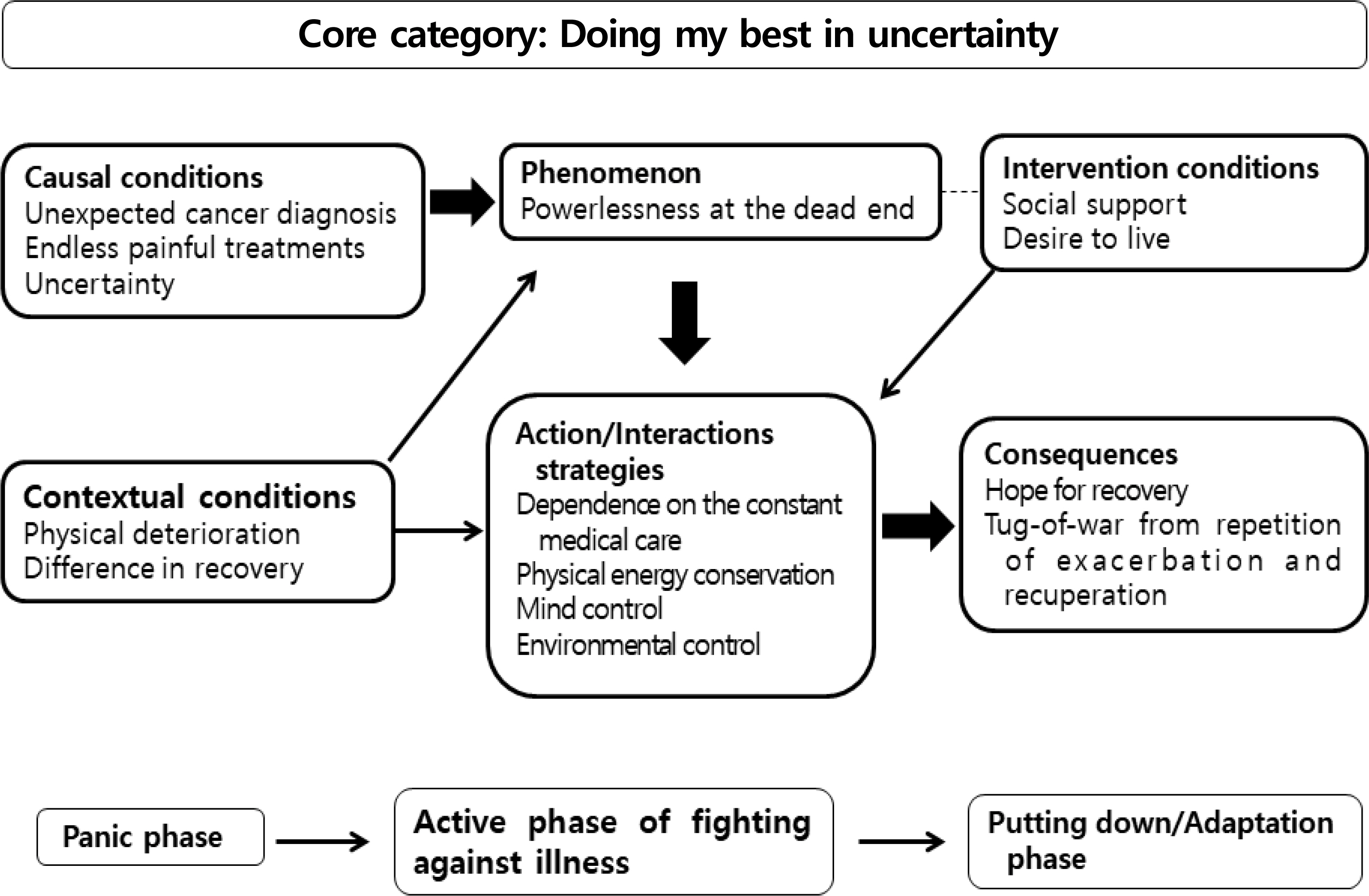Korean J Adult Nurs.
2017 Oct;29(5):472-483. 10.7475/kjan.2017.29.5.472.
The Illness Adaptation Process of Patients Suffering from Myelodysplastic Syndrome (MDS): Doing My Best in Uncertainty
- Affiliations
-
- 1College of Nursing, Dankook University, Cheonan, Korea. aekim@dankook.ac.kr
- KMID: 2406517
- DOI: http://doi.org/10.7475/kjan.2017.29.5.472
Abstract
- PURPOSE
The purpose of this study was to describe and explore the adaptation process of patients with myelodysplastic syndrome (MDS).
METHODS
Using a grounded theory methodology, 15 interviews were performed with nine men and six women, 43-83 years of age, suffering from MDS. Data were analyzed using the constant comparative analysis method.
RESULTS
The core category emerged as "To do my best in uncertainty". MDS patients engaged in three stages: Panic, Active fighting against illness, and Putting down/Adaptation phase. Causal conditions were unexpected cancer diagnosis, endless painful treatment, and uncertainty. Contextual conditions were physical deterioration and differences in recovery. The central phenomenon of the illness adaptation process among the patients with MDS was powerlessness at the dead end. Action/Interaction strategies included dependence on the constant medical care, physical energy conservation, mind control and environmental control. Intervening conditions were social support and desire to live. Consequences were hope for recovery and tug-of-war from repetition of exacerbation and recuperation.
CONCLUSION
When caring for these patients, it is important to identify needs, allow patients to express what they want at that moment and support them in maintaining a daily life.
MeSH Terms
Figure
Reference
-
1. Kröger N. Epigenetic modulation and other options to improve outcome of stem cell transplantation in MDS. Hematology ASH Education Program Book. 2008; 1:60–7. https://doi.org/10.1182/asheducation-2008.1.60.2. Korean Information Center for Disease. Disease codes status of admission and outpatient treatment [Internet]. Seoul: Author;2014. [cited 2016 November 24]. Available from:. http://www.koicd.kr/2016/stats/diseaseStats.do.3. Demakos EP, Kurtin SE. Disease burden and treatment impact associated with myelodysplastic syndromes: initial estimates. Leukemia Research. 2011; 35:S142. https://doi.org/10.1016/S0145-2126(11)70356-3.4. Ridgeway JA, Fechter L, Murray C, Borràs N. Update on the science of myelodysplastic syndromes. Clinical Journal of Oncology Nursing. 2012; 16(3):9–22. https://doi.org/10.1188/12.CJON.S1.9-22.
Article5. Garcia-Manero G. Myelodysplastic syndromes: 2011 update on diagnosis, risk-stratification, and management. American Journal of Hematology. 2011; 86(6):490–8. https://doi.org/10.1002/ajh.22047.
Article6. Kurtin SE, Paterson P, Wintrich S, Iraca T, Hassan AA, Murray D, et al. Patient and family resources for living with myelodysplastic syndromes. Clinical Journal of Oncology Nursing. 2012; 16(3):58–64. https://doi.org/10.1188/12.CJON.S1.58-64.
Article7. Ryblom H, Hast R, Hellström-Lindberg E, Winterling J, Jo-hansson E. Self-perception of symptoms of anemia and fatigue before and after blood transfusions in patients with myelodysplastic syndromes. European Journal of Oncology Nursing. 2015; 19(2):99–106. https://doi.org/10.1016/j.ejon.2014.10.011.
Article8. Thomas ML. The impact of myelodysplastic syndromes on quality of life: lessons learned from 70 voices. The Journal of Supportive Oncology. 2012; 10(1):37–44. https://doi.org/10.1016/j.suponc.2011.05.003.
Article9. Son SY. Illness experience of adolescents with hematologic malignancies. Journal of Korean Academy of Nursing. 2011; 41(5):603–12. https://doi.org/10.4040/jkan.2011.41.5.603.
Article10. Kang YA, Yi MS. Ethnography on isolation unit for hematopoietic stem cell transplantation: focusing on patients. Asian Oncology Nursing. 2009; 9(1):31–42. http://www.dbpia.co.kr/Article/NODE01185252.11. Strauss A, Corbin JM. Basics of qualitative research: techni-ques and procedures for developing grounded theory. 2nd ed.Thousand Oaks: Sage Publications, Inc.;1998. p. 55–60.12. Sandelowski M. The problem of rigor in qualitative research. Advances in Nursing Science. 1986; 8(3):27–37.
Article13. Lee YS, Tak YR. Experiences of spouses of patients with hematologic malignancies: finding a way to get out of the endless tunnel. Asian Oncology Nursing. 2016; 16(1):46–57. https://doi.org/10.5388/aon.2016.16.1.46.
Article14. Protière C, Moumjid N, Bouhnik AD, Le Corroller Soriano AG, Moatti JP. Heterogeneity of cancer patient information-seeking behaviors. Medical Decision Making. 2012; 32(2):362–75. https://doi.org/10.1177/0272989X11415114.
Article15. Yi MS, Park EY, Kim DS, Tae YS, Chung BY. So HS. Psychosocial adjustment of low-income Koreans with cancer. Journal of Korean Academy of Nursing. 2011; 41(2):225–35. https://doi.org/10.4040/jkan.2011.41.2.225.16. Steensma DP, Heptinstall KV, Johnson VM, Novotny PJ, Sloan JA, Camoriano JK, et al. Common troublesome symptoms and their impact on quality of life in patients with myelodysplastic syndromes (MDS): results of a large internet-based survey. Leukemia Research. 2008; 32(5):691–8. https://doi.org/10.1016/j.leukres.2007.10.015.
Article17. Sprod LK, Mohile SG, Demark-Wahnefried W, Janelsins MC, Peppone LJ, Morrow GR, et al. Exercise and cancer treatment symptoms in 408 newly diagnosed older cancer patients. Journal of Geriatric Oncology. 2012; 3(2):90–7. https://doi.org/10.1016/j.jgo.2012.01.002.
Article18. Jung AR, Yi M. Predictive factors of supportive care needs in patients with hematologic malignancy. Korean Journal of Adult Nursing. 2011; 23(5):460–71.19. Grulke N, Larbig W, Käachele H, Bailer H. Pretransplant depression as risk factor for survival of patients undergoing allogeneic hematopoietic stem cell transplantation. Psycho-Oncology. 2008; 17(5):480–7. https://doi.org/10.1002/pon.1261.20. Jung MJ, Lee HJ. Predictors of quality of life following HSCT recipients. Korean Journal of Adult Nursing. 2008; 20(2):341–52.21. Hong SS, Park HR. Predictors of resilience in adolescents with leukemia. Journal of Korean Academy of Nursing. 2015; 45(4):595–603. https://doi.org/10.4040/jkan.2015.45.4.595.
Article22. Kim YJ. Allogeneic hematopoietic stem cell transplantation for myelodysplastic syndromes. Korean Journal of Medicine. 2009; 76(2):126–36.23. Kim YJ. Life experience of inpatients with recurrent breast cancer. Journal of Korean Academy of Nursing. 2011; 41(2):214–24. https://doi.org/10.4040/jkan.2011.41.2.214.
Article24. Knott V, Turnbull D, Olver I, Winefielc A. A grounded theory approach to understand the cancer-coping process. British Journal of Health Psychology. 2012; 17(3):551–64. https://doi.org/10.1111/j.2044-8287.2011.02054.x.
Article
- Full Text Links
- Actions
-
Cited
- CITED
-
- Close
- Share
- Similar articles
-
- Myelodysplastic syndrome with genetic predisposition
- A Case of Erythema Nodosum-like Leukemia Cutis in a Patient with Myelodysplastic Syndrome
- Unusual Cutaneous Neutrophilic Infiltration in Myelodysplasia Syndrome : A Nuclear Segmentation Anomaly
- Myelodysplastic syndromes and overlap syndromes
- A Case of Myelodysplastic Syndrome with Behcet's Disease


